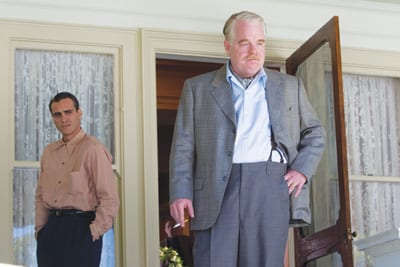I’m not sure you could convince me that Paul Thomas Anderson is any less of a charlatan than L. Ron Hubbard. Both men have created cults around themselves — Hubbard with a phony religion (Scientology) made up to exploit closeted Hollywood stars and make a fortune; Anderson, a slate of films that are less brilliant than they pretend to be. Still, I think the comparisons end there; Hubbard was a megalomaniac and a bully, a man who allowed his greed to become a destructive mind-game; Anderson just wants to make movies.
Some of his movies are entertaining, if not the masterpieces his followers believe them to be. Boogie Nights was a mainstream film masquerading as indie-art; There Will Be Blood an overlong sick comedy in which Anderson seemed to be teasing his audience about their limits of tolerance. With The Master, he finally exceeds our capacity to indulge him.
The leading character in Blood was a dark soul, a villainous man in many ways, but you could understand him and even sympathize; the same cannot be said of any characters in The Master, a fictionalized idyll on the founding of Scientology, where Hubbard aka Lancaster Dodd (Philip Seymour Hoffman) enlists a shell-shocked World War II sailor named Freddie (Joaquin Phoenix) as a kind of half enforcer, half pet, as he preaches his gospel of “programming” (talk about brainwashing!). Every single character is despicable.
Anderson, forever l’artiste, never feels an obligation to explain himself (remember the raining frogs in Magnolia?), so not a lot here makes sense, even owing to the vagaries of creative impulse. We never have a sense for why Dodd keeps Freddie around, with the possible exception that he hopes to use Freddie as the lab-rat that assuages his own guilt about fleecing good people — maybe he can actually make Freddie’s life better. If so, that’s a slender thread on which to dangle a storyline that is densely opaque.
Phoenix, the squirreliest of actors, goes on a full-out acorn hunt here, with Anderson seeming to give him free rein to turn tics into techniques. I hesitate to call it a bad performance, because it’s not really that; it just feels unnecessary — and character in search of a motivation. Hoffman is persuasively narcissistic, but Amy Adams, as Dodd’s wife, is a walking zero here, as uninteresting as wallpaper in a bus stop men’s room.
It’s ironic, that this movie critiques Dodd’s techniques, since Anderson himself is all about process. He’s a gifted stylist who treats moviemaking as a social experiment. Pardon me for not joining the cult.
Two stars. Opens today at Landmark’s Magnolia Theatre.
This article appeared in the Dallas Voice print edition September 21, 2012.


